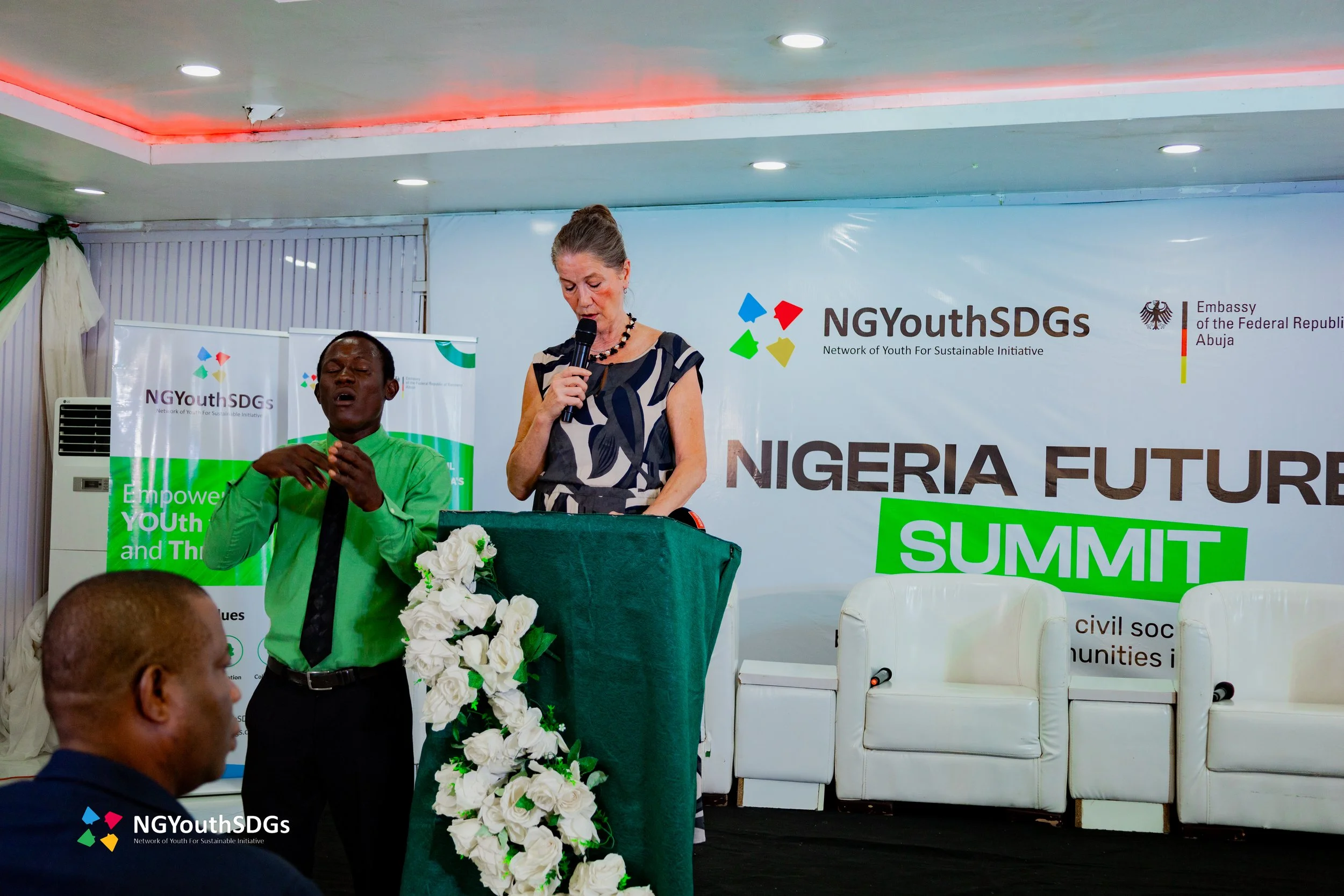The Green Institute
The Nigeria Future Summit 2024, held from October 8-9 in Abuja, tagged ‘Empowering Youth Civil Society to Build Stronger Communities in Nigeria Project’ brought together young leaders, climate experts, policymakers, and key stakeholders to discuss urgent climate action and youth inclusion in policy.
With Nigeria reviewing and preparing for NDCs 3.0 submission in 2025 and COP29, the event highlighted the pivotal role that young people can play in shaping climate policy and the necessity for their engagement in the face of Nigeria’s climate challenges. Discussions highlighted the nation’s urgent need for strategic planning to mitigate the impacts of climate change, from southern flooding and coastal erosion to northern droughts, food insecurity, and conflicts. Organized by the Nigeria Youth SDGs and supported by the German Mission in Nigeria, the summit aimed to address the exclusion of youth, women, and persons with disabilities (PWDs) from critical climate decision-making processes.
The first day of the summit featured presentations from 15 Civil Society Organizations (CSOs), including The Green Institute, drawn from five states, which are Ondo, Delta, Kaduna, Enugu and Nasarawa. These organizations shared experiences from their grassroots step down training and community dialogue, including successes in raising awareness about climate change, challenges in advocacy, and future strategies for deeper engagement in communities. These local reports were part of broader efforts that will lead to the co-creation of Local Adaptation Plans Actions (LAPA) in the five states, reflecting the unique climate challenges in each region. These plans will be presented to the state governments for integration into local climate strategies.
The second day began with an opening speech by Mr. Joshua Alade, Founder and Executive Director of NGYouthSDGs, who urged Nigerian youth to take proactive roles in climate advocacy. He cited their underrepresentation at COP meetings and the ongoing review Nigeria NCDs 3.0. He highlighted the need for youth inclusion when it comes to national and international climate policies.
A keynote speech by the German Ambassador to Nigeria, Her Excellency Annett Günther, reiterated the global commitment to youth participation in climate action. The Ambassador emphasized that Germany is deeply committed to helping developing countries, including Nigeria, achieve their climate goals, and called for youth to be central in these efforts. She highlighted the importance of turning youth climate ambitions into reality, especially ahead of COP29, and framed climate change as a defining challenge that requires collaboration, resolve, and solidarity between generations.
The first panel discussion, featuring Hon. Rinsola Abiola, SSA to the President on Citizenship and Leadership; Mr.Joshua Alade, Founder, NGYouthSDGs; Mr. Stephen Agugua, ILO National Project Coordinator, and Ms. Bernard Ogechi Mercy (Founder, Eco-cyclers), focused on defining Nigeria’s priorities for COP29. Hon. Rinsola Abiola highlights the role of capacity building in ensuring awareness at the community level. With data being a major issue in Nigeria, he mentioned how AI technology can be used to enhance climate data collection and decision-making. Mr. Stephen Agugua highlighted the impact of climate change on employment, emphasizing that the transition to green energy could create job opportunities in sectors like green jobs. He stressed the committed of ILO in the green economy, particularly through the Nigerian Decent Work Program running from 2023 to 2027, which seeks to create job for the youth. Ms. Bernard Ogechi Mercy encouraged youth to be resilient and persistent in advocating for climate action. She urged young climate activists to believe in their power to create change within their communities. Mr. Alade addressed the barriers young people face in climate policy discussions, particularly their exclusion from past reviews of Nigeria's NDCs. He emphasized the need for platforms that enable youth to engage in climate action effectively. Quoting the President of Nigeria, he stated, “Power is not served a la carte. You have to struggle for power,” reinforcing the idea that youth must actively advocate for their place in decision-making processes to ensure their voices are heard in climate policy discussions
The second panel discussion, focusing on "Youth Leadership in Climate Action: Strategies for Influence and Impact, featured Mr. Friday Ogezi, Climate Justice Advisor at ActionAid Nigeria; Ms. Chinwe Abuwa, Policy & Advocacy Officer at ONE Campaign; and Mr. Lucky Abeng, Climate Justice Campaigner. Mr. Ogezi emphasized the importance of long-term planning and government support for community-level climate solutions. Ms. Abuwa advocated for financial and educational investments in youth, emphasizing the need for "smart aid" from developed nations to empower scalable solutions. She also called for reforming educational systems to equip youth with the skills necessary to combat climate change. Mr. Abeng emphasized the need to shift from "meaningful youth engagement" to "meaningful youth investment." He highlighted the importance of developing a bottom-up approach to address the climate crisis, pointing out that marginalized youth must actively claim their space in climate action. According to him, youth will not be automatically given a seat at the decision-making table, so strategic planning and proactive steps are crucial for achieving meaningful influence and impact in the climate space.
The summit concluded with a call to action for youth, urging them to continue advocating for space in national and global climate conversations that concern their future. As Nigeria prepares for COP29 and the ongoing review of its Nationally Determined Contributions (NDCs), the event re-echoed the necessity of youth involvement in crafting sustainable climate solutions. In line with global goals, the future of Nigeria’s climate policy depends on inclusive, collaborative efforts that leave no one behind, especially the youth, who represent the largest sector of the population.
Finally, it is crucial for youth to awaken and unite in advocating for space in climate policy engagement. As the saying goes, "If you want to go fast, go alone; if you want to go far, go together." The quest for achieving resilience and sustainable communities is significant, but with collaborative efforts, we can make a greater impact. As youth, our voices matter. It is vital that youth voices are amplified and recognized in the climate dialogue to drive meaningful change. #ClimateActionForStrongerNaija #OfficiallyGreen













